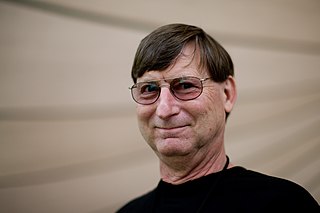
Microeconomics is a branch of mainstream economics that studies the behavior of individuals and firms in making decisions regarding the allocation of scarce resources and the interactions among these individuals and firms. Microeconomics focuses on the study of individual markets, sectors, or industries as opposed to the national economy as whole, which is studied in macroeconomics.

Alfred Marshall was an English economist, who was one of the most influential economists of his time. His book, Principles of Economics (1890), was the dominant economic textbook in England for many years. It brought the ideas of supply and demand, marginal utility, and costs of production into a coherent whole. He is known as one of the founders of neoclassical economics.

Antoine Augustin Cournot was a French philosopher and mathematician who also contributed to the development of economics.
David Marc "Dave" Kreps is a game theorist and economist and professor at the Graduate School of Business at Stanford University. The Stanford University Department of Economics appointed Kreps the Adams Distinguished Professor of Management. He is known for his analysis of dynamic choice models and non-cooperative game theory, particularly the idea of sequential equilibrium, which he developed with Stanford Business School colleague Robert B. Wilson.

Hal Ronald Varian is Chief Economist at Google and holds the title of emeritus professor at the University of California, Berkeley where he was founding dean of the School of Information. Varian is an economist specializing in microeconomics and information economics.
Mesoeconomics or Mezzoeconomics is a neologism used to describe the study of economic arrangements which are not based either on the microeconomics of buying and selling and supply and demand, nor on the macroeconomic reasoning of aggregate totals of demand, but on the importance of the structures under which these forces play out, and how to measure these effects. Mesoeconomics, as a science, began to take shape back in the 19th century. Among the researchers, the most notable contribution to the development of problems of regional economic theory, issues of the location of production forces and the efficiency of regional production was made by German economists - Johann Heinrich Thünen, Alfred Weber, Walter Kristaller, August Lesch, professor of economics at the University of Pennsylvania Walter Isard, French economist Jean Chardonnay, American economist of Russian origin Vasily Leontiev, V. Thompson, T. Palander, as well as the authors of the famous textbooks H. Armstrong and J. Taylor. Among Soviet researchers of the first half of the 20th century, G.M. Krzhizhanovsky, I.G. Alexandrova, V.V. Kuibyshev, N.N. Kolosovsky, who dealt with long-term planning and economic zoning. Among the Russian scientists of the second half of the 20th century, research in the field of regional distribution, the creation of territorial production complexes and the efficiency of regional production: T.S. Khachaturova, Ya.G. Feigina, N.N. Nekrasov, A.G. Granberg, P.M. Alampieva, E.B. Alaeva, K.N. Bedrintseva, G.I. Granik, F.D. Zastavny, R.S. Livshits, K.I. Klimenko, Yu.K. Kozlova, A.M. Korneeva, V.V. Kistanova, A.G. Omarovsky, N.N. Oznobina, V.F. Pavlenko, M.M. Palamarchuk, Yu.G. Saushkina, E. D. Silaeva, N.I. Shraga and V.M. Torosov. Several books on this topic, including the book by V.M. Torosov. "Mesoeconomics" of 2004, Mann 2011 [2] and Eng 1987, [3] most accurately determine the field of application of mesoeconomics. As of 2014, 474 articles and books have been written on this topic.
Applied economics is the application of economic theory and econometrics in specific settings. As one of the two sets of fields of economics, it is typically characterized by the application of the core, i.e. economic theory and econometrics to address practical issues in a range of fields including demographic economics, labour economics, business economics, industrial organization, agricultural economics, development economics, education economics, engineering economics, financial economics, health economics, monetary economics, public economics, and economic history. From the perspective of economic development, the purpose of applied economics is to enhance the quality of business practices and national policy making.
Nonlinear pricing is a broad term that covers any kind of price structure in which there is a nonlinear relationship between price and the quantity of goods. An example is affine pricing. A nonlinear price schedule is a menu of different-sized bundles at different prices, from which the consumer makes his selection. In such schedules, the larger bundle generally sells for a higher total price but a lower per-unit price than a smaller bundle.
Economics education or economic education is a field within economics that focuses on two main themes:
Business economics is a field in applied economics which uses economic theory and quantitative methods to analyze business enterprises and the factors contributing to the diversity of organizational structures and the relationships of firms with labour, capital and product markets. A professional focus of the journal Business Economics has been expressed as providing "practical information for people who apply economics in their jobs."
Yoram Barzel is an Israeli economist and a professor in the Department of Economics at the University of Washington. He is interested in property rights, applied price theory, and political economy.
Joel Dean (1906–1979) was an economist best known for his contributions to corporate finance theory in general, and particularly to the area of capital budgeting. He is regarded as one of the founders of business economics. His work on pricing remains influential in marketing.
Barbara J. Spencer is an Australian-Canadian economist.
Franklin Marvin Fisher was an American economist. He taught economics at the Massachusetts Institute of Technology from 1960 to 2004.
In economics, the marginal product of labor (MPL) is the change in output that results from employing an added unit of labor. It is a feature of the production function, and depends on the amounts of physical capital and labor already in use.
Benoît S. Y. Crutzen is a Belgian economist who currently holds the position of Assistant Professor of the Department of Economics at the Erasmus University Rotterdam (EUR). His research interest focuses on political economy.

A monopoly price is set by a monopoly. A monopoly occurs when a firm lacks any viable competition and is the sole producer of the industry's product. Because a monopoly faces no competition, it has absolute market power and can set a price above the firm's marginal cost. Since marginal cost is the increment in total cost required to produce an additional unit of the product, the firm can make a positive economic profit if it produces a greater quantity of the product and sells it at a lower price.
Professor Hugh Stanley Emrys Gravelle studied at the University of Leeds, where he graduated in BComm. He joined the staff at Queen Mary College, University of London, lecturing in theories and applied microeconomics. He then moved to The University of York, Centre for Health Economics in January 1998 to present.
Engineering Economics in Civil Engineering, also known generally as engineering economics, or alternatively engineering economy, is a subset of economics, more specifically, microeconomics. It is defined as a "guide for the economic selection among technically feasible alternatives for the purpose of a rational allocation of scarce resources." Its goal is to guide entities, private or public, that are confronted with the fundamental problem of economics.
Lynne Pepall is a Canadian-American economist, academic and researcher. She is an Economics Professor and currently chairs the Department of Community Health at Tufts University.




